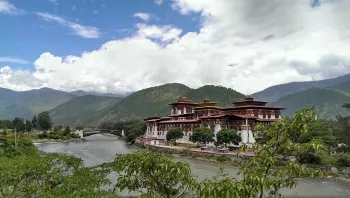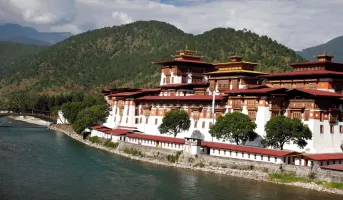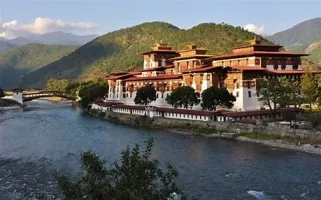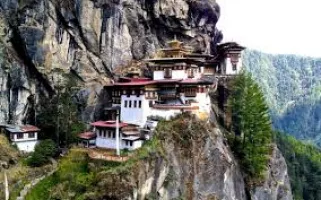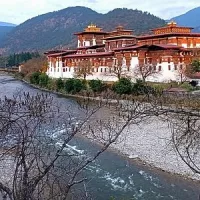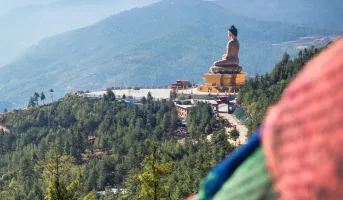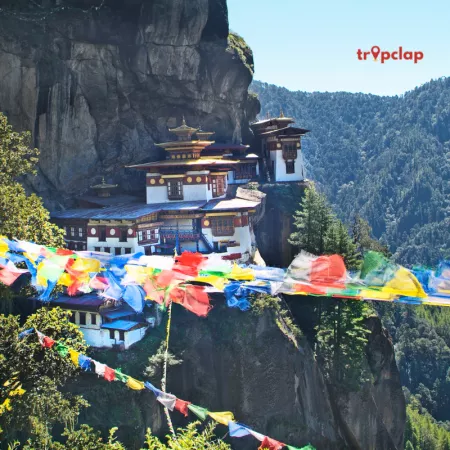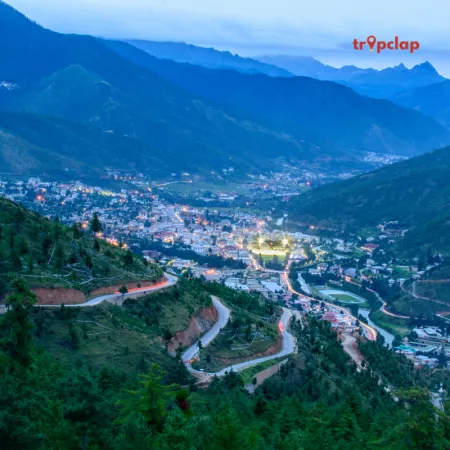
Thimphu
Duration
3 to 5 Days
3 to 5 Days
Best time to visit
Sep-Nov
Sep-Nov
Theme
Hill Station, Adventure, Religious
Hill Station, Adventure, Religious
Thimphu Travel Guide
Thimphu, the capital city of Bhutan, is a unique destination known for its rich cultural heritage, stunning landscapes, and traditional way of life. Situated in the heart of the Himalayas, Thimphu offers visitors a glimpse into a world where modernity coexists harmoniously with ancient traditions. The city is famous for being the only capital in the world without traffic lights, emphasizing the country's commitment to preserving its cultural identity.Top Attractions in Thimphu
1. Tashichho Dzong 2. Buddha Dordenma Statue 3. National Memorial Chorten 4. Changangkha Lhakhang 5. Motithang Takin PreserveThimphu is Famous for
Breathtaking landscapes and preserving its cultural heritage.Top Attractions in Thimphu
- Tashichho Dzong - Buddha Dordenma Statue - National Memorial Chorten - Changangkha Lhakhang - Motithang Takin PreserveWhat's Great about Travelling to Thimphu?
- Experience a unique blend of tradition and modernity - Explore stunning Himalayan landscapes - Immerse yourself in Bhutanese culture and traditionsWhat's Not So Great about Travelling to Thimphu?
- Limited nightlife options - High-altitude may affect some travelers - Limited shopping opportunitiesTravel Tips for Thimphu
- Ensure to dress modestly and respectfully - Carry cash as credit cards are not widely accepted - Respect local customs and traditionsImportant Thimphu trip information
- Ideal Duration: A week is ideal to explore Thimphu and its surroundings.
- Best Time to Visit: The best time to visit Thimphu is during the spring and autumn months for pleasant weather.
- Nearby Airports and Railway Stations: The nearest airport is Paro International Airport, and there are no railway stations in Bhutan.
Per Person
20,300
*EXCLUDING APPLICABLE TAXES 4.6 Ratings
( 53 Reviews )
( 53 Reviews )
Per Person
25,970
*EXCLUDING APPLICABLE TAXES 4.9 Ratings
( 185 Reviews )
( 185 Reviews )
Per Person
22,800
*EXCLUDING APPLICABLE TAXES Per Person
17,700
*EXCLUDING APPLICABLE TAXES 4.6 Ratings
( 53 Reviews )
( 53 Reviews )
Per Person
25,499
*EXCLUDING APPLICABLE TAXES 4.6 Ratings
( 53 Reviews )
( 53 Reviews )
Per Person
25,980
*EXCLUDING APPLICABLE TAXES 4.9 Ratings
( 185 Reviews )
( 185 Reviews )
FAQ's on Thimphu
Q1: What is the best time to visit Thimphu?
The best time to visit Thimphu is during the spring and fall months, from March to May and September to November. These periods offer pleasant weather with clear skies, making it ideal for exploring the beautiful landscapes and cultural sites. Additionally, various festivals like Paro Tshechu in spring and Thimphu Tshechu in fall attract many tourists, adding to the vibrant atmosphere of the city.
Q2: Do I need a visa to travel to Thimphu?
Yes, travelers to Thimphu and Bhutan in general require a visa. Visitors must book their trip through a licensed Bhutanese tour operator who will arrange the visa. There are no individual visa applications possible, and a daily fee is also applicable for tourists. It's essential to plan your trip well in advance and comply with the visa requirements to ensure a smooth entry into the country.
Q3: What are the must-visit attractions in Thimphu?
Thimphu offers a range of attractions that should not be missed, including the impressive Tashichho Dzong, the Memorial Chorten, and the Buddha Dordenma statue. Visitors can also explore the Folk Heritage Museum, Changangkha Lhakhang, and the National Library. Nature lovers can head to Motithang Takin Preserve and the surrounding hills for breathtaking views. The weekend market is a vibrant hub of local culture and products, providing a unique shopping experience for tourists.
Q4: Is Thimphu a safe place to travel?
Thimphu is considered a safe destination for travelers. The crime rate is low, and the locals are known for their hospitality and friendliness. However, like any other city, it's advisable to take general precautions such as safeguarding your belongings and being aware of your surroundings, especially in crowded areas. It is recommended to respect local customs and traditions to ensure a smooth and safe travel experience in Thimphu.
Q5: What is the local currency in Thimphu and can I use credit cards?
The local currency in Thimphu is the Bhutanese Ngultrum (BTN), but the Indian Rupee is widely accepted. While credit cards are becoming more common in hotels and larger shops, it's advisable to carry cash for smaller purchases and transactions. ATMs are available in the city, but it's recommended to withdraw cash in advance, especially if you plan to visit remote areas where card facilities may be limited.
Q6: What is the local cuisine like in Thimphu?
Thimphu offers a unique culinary experience with traditional Bhutanese dishes like Ema Datshi (chili and cheese stew), Phaksha Paa (pork with red chilies), and Momos (dumplings). Rice is a staple in Bhutanese cuisine, and you can also try Ara, a local distilled spirit. Vegetarians will find plenty of options like Kewa Datshi (potatoes with cheese) and Jasha Maroo (spicy chicken). Be prepared for spicy flavors, and don't miss the opportunity to taste local teas and snacks. Dietary preferences can be accommodated in most restaurants, but it's advisable to inform the staff in advance.
Q7: What transportation options are available in Thimphu?
In Thimphu, travelers can explore the city using public buses, taxis, and rental cars. Taxis are readily available and are a convenient way to get around the city. Rental services for cars and bikes are also available for those who prefer more flexibility in their itinerary. Walking is a great way to explore the city center, where many attractions are within walking distance. For longer journeys to other parts of Bhutan, domestic flights and buses are available. It's recommended to plan your transportation in advance, especially during peak tourist seasons.
Q8: Are there any cultural norms or etiquette I should be aware of when visiting Thimphu?
When visiting Thimphu, it's important to respect the local customs and traditions. Dress modestly, especially when visiting religious sites like temples and dzongs. It's customary to remove your shoes before entering religious buildings and to walk clockwise around stupas and prayer wheels. Avoid pointing at people or religious objects with your fingers and always ask for permission before taking photos of locals. It's also polite to greet people with a slight bow (jomolhari) and to be mindful of your behavior in public spaces. By showing respect for the local culture and traditions, you can have a more enriching and positive experience in Thimphu.
Q9: I am a travel agent. How can I buy travel leads of Thimphu?
Register yourself as a travel agent at agents.tripclap.com and then you can buy travel leads to Thimphu once your account is approved. For more details contact our support team at +91-8069186564 or support@tripclap.com
